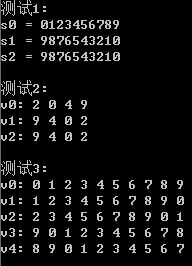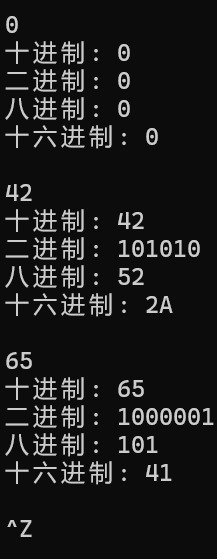实验1 现代C++编程初体验
任务1:

// 现代C++标准库、算法库体验 // 本例用到以下内容: // 1. 字符串string, 动态数组容器类vector、迭代器 // 2. 算法库:反转元素次序、旋转元素 // 3. 函数模板、const引用作为形参 #include <iostream> #include <string> #include <vector> #include <algorithm> using namespace std; // 声明 // 模板函数声明 template<typename T> void output(const T &c); // 普通函数声明 void test1(); void test2(); void test3(); int main() { cout << "测试1: \n"; test1(); cout << "\n测试2: \n"; test2(); cout << "\n测试3: \n"; test3(); } // 函数实现 // 输出容器对象c中的元素 template <typename T> void output(const T &c) { for(auto &i: c) cout << i << " "; cout << endl; } // 测试1 // 组合使用算法库、迭代器、string反转字符串 void test1() { string s0{"0123456789"}; cout << "s0 = " << s0 << endl; string s1{s0}; reverse(s1.begin(), s1.end()); // 反转指定迭代器区间的元素 cout << "s1 = " << s1 << endl; string s2{s0}; reverse_copy(s0.begin(), s0.end(), s2.begin()); // 将指定迭代区间的元素拷贝到指定迭代器开始的目标区间,并且在复制过程中反转次序 cout << "s2 = " << s2 << endl; } // 测试2 // 组合使用算法库、迭代器、vector反转动态数组对象vector内数据 void test2() { vector<int> v0{2, 0, 4, 9}; cout << "v0: "; output(v0); vector<int> v1{v0}; reverse(v1.begin(), v1.end()); cout << "v1: "; output(v1); vector<int> v2{v0}; reverse_copy(v0.begin(), v0.end(), v2.begin()); cout << "v2: "; output(v2); } // 测试3 // 组合使用算法库、迭代器、vector实现元素旋转移位 void test3() { vector<int> v0{0, 1, 2, 3, 4, 5, 6, 7, 8, 9}; cout << "v0: "; output(v0); vector<int> v1{v0}; rotate(v1.begin(), v1.begin()+1, v1.end()); // 旋转指定迭代器区间[v1.begin(), v1.end())之间的数据项,旋转后从迭代器v1.begin()+1位置的数据项开始 cout << "v1: "; output(v1); vector<int> v2{v0}; rotate(v2.begin(), v2.begin()+2, v2.end()); cout << "v2: "; output(v2); vector<int> v3{v0}; rotate(v3.begin(), v3.end()-1, v3.end()); cout << "v3: "; output(v3); vector<int> v4{v0}; rotate(v4.begin(), v4.end()-2, v4.end()); cout << "v4: "; output(v4); }

任务2:

#include <iostream> #include <vector> #include <string> #include <algorithm> #include <numeric> #include <iomanip> using namespace std; // 函数声明 // 模板函数声明 template<typename T> void output(const T &c); // 普通函数声明 int rand_int_100(); void test1(); void test2(); int main() { cout << "测试1: \n"; test1(); cout << "\n测试2: \n"; test2(); } // 函数实现 // 输出容器对象c中的元素 template <typename T> void output(const T &c) { for(auto &i: c) cout << i << " "; cout << endl; } // 返回[0, 100]区间内的一个随机整数 int rand_int_100() { return rand() % 101; } // 测试1 // 对容器类对象指定迭代器区间进行赋值、排序 void test1() { vector<int> v0(10); // 创建一个动态数组对象v0, 对象大小为10 generate(v0.begin(), v0.end(), rand_int_100); // 产生[0, 100]之间的随机整数赋值给指定迭代器区间[v0.begin(), v0.end())内的每个数据项 cout << "v0: "; output(v0); vector<int> v1{v0}; sort(v1.begin(), v1.end()); // 对指定迭代器区间[v1.begin(), v1.end())内数据项进行升序排序 cout << "v1: "; output(v1); vector<int> v2{v0}; sort(v2.begin()+1, v2.end()-1); // 对指定迭代器区间[v1.begin()+1, v1.end()-1)内数据项进行升序排序 cout << "v2: "; output(v2); } // 测试2 // 对容器类对象指定迭代器区间进行赋值、计算最大值/最小值/均值 void test2() { vector<int> v0(10); generate(v0.begin(), v0.end(), rand_int_100); cout << "v0: "; output(v0); auto iter1 = min_element(v0.begin(), v0.end()); cout << "最小值: " << *iter1 << endl; auto iter2 = max_element(v0.begin(), v0.end()); cout << "最大值: " << *iter2 << endl; auto ans = minmax_element(v0.begin(), v0.end()); cout << "最小值: " << *(ans.first) << endl; cout << "最大值: " << *(ans.second) << endl; double avg1 = accumulate(v0.begin(), v0.end(), 0)/v0.size(); cout << "均值: " << fixed << setprecision(2) << avg1 << endl; cout << endl; vector<int> v1{v0}; cout << "v0: "; output(v0); sort(v1.begin(), v1.end()); double avg2 = accumulate(v1.begin()+1, v1.end()-1, 0)/(v1.size()-2); cout << "去掉最大值、最小值之后,均值: " << avg2 << endl; }

任务3:

1 #include <iostream> 2 #include <string> 3 #include <algorithm> 4 5 bool is_palindrome(std::string s); 6 7 int main() { 8 using namespace std; 9 string s; 10 11 while(cin >> s) // 多组输入,直到按下Ctrl+Z后结束测试 12 cout << boolalpha << is_palindrome(s) << endl; 13 } 14 bool is_palindrome(std::string s) 15 { 16 bool t =false; 17 std::string s1(s); 18 reverse(s.begin(),s.end()); 19 if(s==s1) 20 { 21 t=true; 22 } 23 return t; 24 } 25 // 函数is_palindrom定义 26 // 待补足 27 // ×××

任务4:

1 #include <iostream> 2 #include <string> 3 #include <algorithm> 4 5 std::string dec2n(int x, int n = 2); 6 7 int main() { 8 using namespace std; 9 10 int x; 11 while(cin >> x) { 12 cout << "十进制: " << x << endl; 13 cout << "二进制: " << dec2n(x) << endl; 14 cout << "八进制: " << dec2n(x, 8) << endl; 15 cout << "十六进制: " << dec2n(x, 16) << endl << endl; 16 } 17 } 18 std::string dec2n(int x,int n ) 19 { 20 using namespace std; 21 string op="0123456789ABCDEF"; 22 string ans; 23 while(x/n) 24 { 25 ans.append(op,x%n,1); 26 x/=n; 27 } 28 ans.append(op,x%n,1); 29 reverse(ans.begin(),ans.end()); 30 return ans; 31 } 32 33 // 函数dec2n定义 34 // 待补足 35 // ×××

任务5:

1 #include<bits/stdc++.h> 2 using namespace std; 3 4 int main() 5 { 6 cout << " "; 7 for (int i = 0;i <26;i++) 8 cout << setw(2) << (char)('a' + i); 9 cout << endl; 10 11 for (int i = 1;i < 27;i++) 12 { 13 cout << setw(2) << i; 14 for (int j = 0;j<26;j++) 15 { 16 if ('A' + i +j <= 'Z') 17 cout << setw(2) << (char)('A'+i+j); 18 else 19 cout << setw(2) << (char)('A'+i+j-26); 20 } 21 cout << endl; 22 } 23 24 return 0; 25 }

任务6:

1 #include<bits/stdc++.h> 2 3 using namespace std; 4 5 char Operator() { 6 char ops[] = {'+', '-', '*', '/'}; 7 return ops[rand() % 4]; 8 } 9 10 int main() { 11 srand(time(0)); 12 int sum = 0; 13 14 for (int i = 0; i < 10; ++i) { 15 int num1 = rand() % 10 + 1; 16 int num2 = rand() % 10 + 1; 17 char op = Operator(); 18 int canswer; 19 double uanswer; 20 21 22 if (op == '-') { 23 if (num1 < num2) { 24 swap(num1, num2); 25 } 26 canswer = num1 - num2; 27 } else if (op == '/') { 28 while (num1 % num2 != 0) { 29 num2 = rand() % 10 + 1; 30 } 31 canswer = num1 / num2; 32 } else if (op == '+') { 33 canswer = num1 + num2; 34 } else if (op == '*') { 35 canswer = num1 * num2; 36 } 37 38 39 cout << num1 << " " << op << " " << num2 << " = "; 40 cin >> uanswer; 41 42 43 if (uanswer == canswer) { 44 sum++; 45 } 46 } 47 48 double accuracy = (double)sum / 10 * 100; 49 cout << fixed << setprecision(2); 50 cout << "正确率: " << accuracy << "%" << endl; 51 52 return 0; 53 }







【推荐】国内首个AI IDE,深度理解中文开发场景,立即下载体验Trae
【推荐】编程新体验,更懂你的AI,立即体验豆包MarsCode编程助手
【推荐】抖音旗下AI助手豆包,你的智能百科全书,全免费不限次数
【推荐】轻量又高性能的 SSH 工具 IShell:AI 加持,快人一步
· 被坑几百块钱后,我竟然真的恢复了删除的微信聊天记录!
· 【自荐】一款简洁、开源的在线白板工具 Drawnix
· 没有Manus邀请码?试试免邀请码的MGX或者开源的OpenManus吧
· 园子的第一款AI主题卫衣上架——"HELLO! HOW CAN I ASSIST YOU TODAY
· 无需6万激活码!GitHub神秘组织3小时极速复刻Manus,手把手教你使用OpenManus搭建本